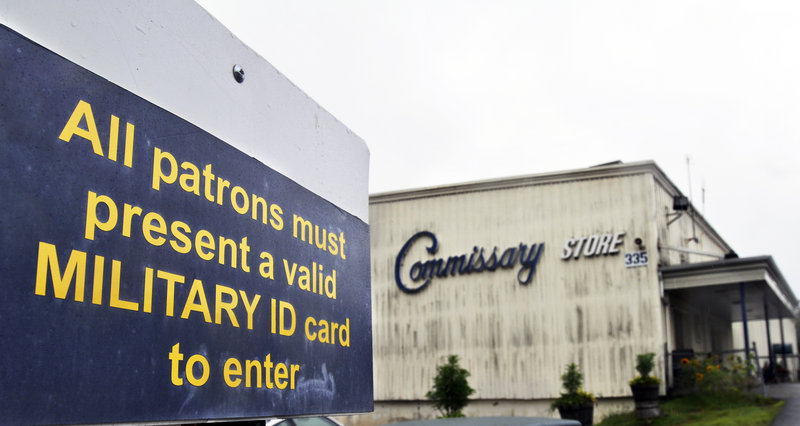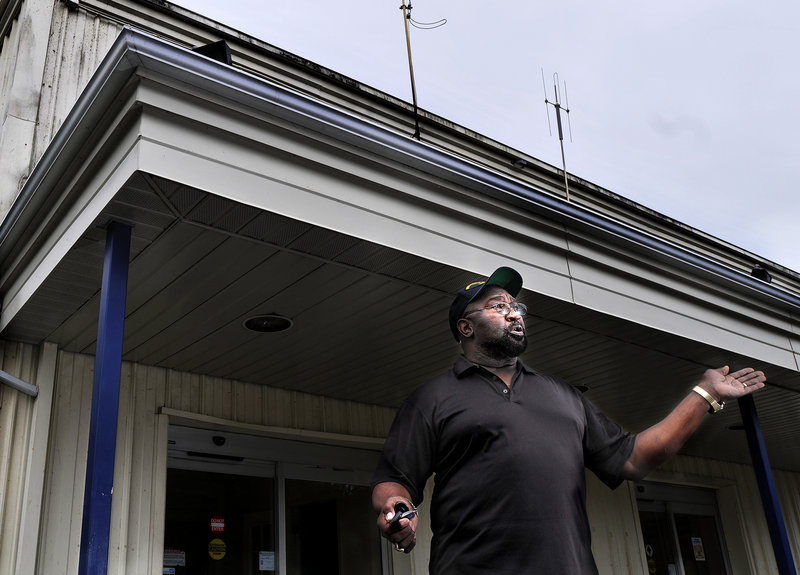TOPSHAM – Like thousands of other veterans and military family members in southern Maine, Gregory Dunn heard rumblings that the Brunswick-Topsham commissary would close this year along with the Brunswick Naval Air Station.
But he never imagined it would happen.
Dunn, who retired from the Navy in 1999 after a 20-year career, was angry after learning this week that the Department of Defense will shut down the commissary, which sells groceries and other goods to military families at deeply discounted prices.
All four members of Maine’s congressional delegation have vowed to fight for a reversal of Tuesday’s decision. If they are unsuccessful, the 37-year-old commissary will close Oct. 8.
“The government just put us on the chopping block and cut us off,” said Dunn, a Louisiana native who fell in love with Maine while he was stationed here.
The commissary was one of the major reasons Dunn and his wife were able to retire to Brunswick. Without it, he said, people on fixed incomes will have to go to traditional supermarkets and buy less food, or go to the much smaller commissaries in Bangor and Portsmouth, N.H.
“What about the old guys in the wintertime? They’ve got to drive to Portsmouth just to get their food? This is just not fair,” he said, standing outside the entrance of the commissary Wednesday. “Maine has sacrificed more than its share for the U.S. You have to ask yourself, what is the U.S. doing for Maine?”
Maine’s congressional delegates agree, but so far they haven’t had any luck convincing Defense Department officials, who hope to save about $2.1 million per year by closing the commissary.
Republican Sens. Olympia Snowe and Susan Collins, along with Democratic Reps. Chellie Pingree and Mike Michaud, sent letters on May 10, June 3 and July 21 to Dr. Clifford Stanley, undersecretary of defense for personnel and readiness.
They urged him to keep the Brunswick-Topsham commissary open because — despite the long drawdown and final closure of the naval base in May — the commissary still serves more than 10,000 active duty, National Guard and Reserve personnel, retirees and other eligible beneficiaries in the region.
The delegates have proposed making it an “enhanced commissary” that would sell tobacco and alcohol without the deep discounts offered on other products. Those sales could boost profits and reduce the government’s expenses for operating the commissary, the delegates have argued.
Pingree and Michaud inserted an amendment in a defense authorization bill that was passed by the House earlier this year. It would create a one-year pilot program for enhanced commissaries at Topsham and other stores around the country. Snowe and Collins are trying to get the same provision passed in the Senate this summer.
They have lobbied to keep the commissary open as those pieces of legislation are considered. They also have argued that the criteria used by the Defense Department to justify the closure were “not clear,” according to a Government Accountability Office report.
Stanley never responded to their concerns, the delegates said, until he contacted them Tuesday to inform them that the commissary would close Oct. 8. The delegation issued a media release Tuesday night, blasting the Pentagon’s decision.
“This is extremely disappointing news for the servicemen and women, military retirees and families who live in the Brunswick-Topsham region,” Snowe said in the prepared statement. “That these patriots must lose a key resource in their community during these difficult economic times is ill-informed and inexcusable.”
The delegates followed that up Wednesday with a joint letter to Stanley’s boss, Secretary of Defense Leon Panetta, urging him to reverse the decision.
“Yesterday was the first time that we have heard from Under Secretary Stanley on this issue. This failure to respond to our requests for a dialogue on a matter of such significant importance is troubling and unacceptable,” Snowe, Collins, Pingree and Michaud said in their letter to Panetta.
“Even though Naval Air Station Brunswick has closed, the Topsham Commissary is projected to continue to serve more eligible personnel, perform with greater efficiency, and have more sales than many other commissaries in operation around the United States,” the letter said.
Cynthia O. Smith, a Department of Defense spokeswoman, said she could not comment on correspondence between the members of Congress and Panetta, but she did lay out the rationale behind the closure.
The closure is necessary to achieve the full savings projected when base closures were approved in 2005, Smith said.
“Keeping the commissary open is inconsistent with sound fiscal policy,” she said. “While the department empathizes with the desires to continue commissary operations, the cost of this support is not a good return on investment for the department.”
A total of 27 government employees at the commissary and 37 nongovernment workers, including baggers, will lose their jobs. The commissary has sold groceries and other goods at cost plus a 5 percent surcharge.
Elizabeth Mazzotti said the closure essentially means a $4,000- or $5,000-a-year pay cut for her husband, Army recruiter Dominic Mazzotti.
“It’s going to be tough,” Mazzotti said Wednesday as she unloaded groceries and buckled her 2- and 4-year-old sons into her car in the commissary parking lot.
The family lives in Topsham, and Dominic Mazzotti works at the recruiting office in Waterville. Elizabeth Mazzotti said she spends about $150 per week at the commissary, and the same items probably would cost her as much as $250 at another store.
Even with the base closed, Mazzotti said, the commissary has remained very busy, and people usually show up early in the morning to get the food and other items they want. Already preparing for the closure, Mazzotti stocked up on Kona coffee Wednesday.
Holly Gowell of Bath described the impending closure as a slap in the face.
“My daughter’s father went to Iraq twice. She is 5 years old,” Gowell said. “It’s as if the Defense Department is saying your service and sacrifice don’t matter. There are so many people who depend on this.”
Gowell, who has shopped at the commissary for about 10 years, said she can buy fresh meats, vegetables and milk because of the discount.
“A lot of those things, I won’t be able to afford” elsewhere, Gowell said.
Staff Writer Trevor Maxwell can be contacted at 791-6451 or at:
tmaxwell@pressherald.com
Send questions/comments to the editors.





Comments are no longer available on this story